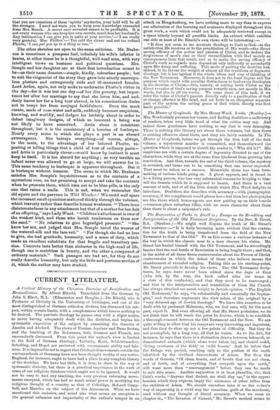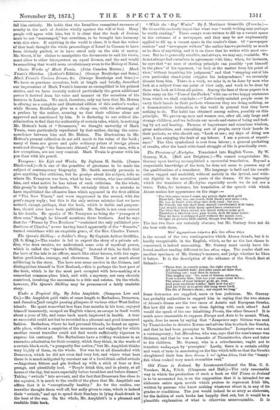The Restoration of Paths to Dwell in ; Essays on
the Re-editing and Interpretation of the Old Testament Scriptures. By the Rev. B. Street, B.A. (Strahan.)—We might well dispute the truth of Mr. Street's first sentence :—" It is daily becoming more evident that the conten- tion for the truth is being transferred from the field of the New Testament to that of the Old." To us this seems a curious instance of the way in which the objects near to a man obscure his vision. Mr. Street has busied himself with the Old Testament, and he accordingly fancies that the real battle of Revelation is being fought there ; and that, in the midst of all these fierce controversies about the Person of Christ controversies in which the defeat of those who believe means the abandonment of revealed religion. Taking this as his starting-point, Mr. Street proceeds to develop his views. The Old Testament Scrip- tures, he says, have never been edited since the days of Ezra (who left, by the way, the book called after his name in a state of dire confusion), and that they need to be rearranged ; and that in the interpretation and translation of them the Church has always attached too much weight to Jewish opinion. "The English Old Testament," ho says, "is substantially and essentially the Septua- gint," and therefore represents the view taken of the original by a "very debased age of Jewish theology." We leave this assertion to be dealt with by professed Hebraists, who, we feel sure, -will, for the most part, reject it. But even allowing all that Mr. Street postulates, we do not think that he will reach the point he desires, which is to establish a thorough concord between the Old Testament and the New. Wo are quite willing to allow that his essays are very interesting and ingenious, and that they do clear up not a few points of difficulty. But they do not accomplish, by a long way, all that he wants. As to the Ark, for instance, he says that there is a distinction drawn between behemoth, or domesticated animals (which alone were taken in), and chaieth sadeh, 'living creatures of the field,' or wild beasts.' And he infers that the Deluge was partial, reaching only to the portion of the earth inhabited by the civilised descendants of Adam. But then the words of Genesis, "Of clean beasts, and of beasts that are not clean, and of fowls, and of everything that creepeth upon 'the earth," will want more than " rearrangement " before they Can be made to suit this sense. Another suggestion is at least plausible, viz, that Cain's words, "Anyone that findeth me shall slay me," in the appre- hension which they express, imply the existence of other tribes than the children of Adam. We should ourselves take it as the writer's way of expressing in a vivid way the conscious guilt of the murderer, used without any thought of literal accuracy. When we come to chapter ix., "The Invasion of Canaan," Mr. Street's method seems to
fail him entirely. lie holds that the Israelites committed excesses of cruelty in the sack of Jericho wholly against the will of God. Many people will agree with him, but it is clear that the book of Joshua must be not "rearranged," but rewritten, to be brought into harmony with this view. If anything in the world is clear, it is that the writer of that book thought the whole proceedings of Israel in Canaan to have been divinely guided, or to have erred only on the side of mercy. Mr. Street, if he claims to manipulate the documents to suit his views, must allow to other interpreters an equal licence, and the end would be something that would seem revolutionary even to the Bishop of Natal.







































 Previous page
Previous page